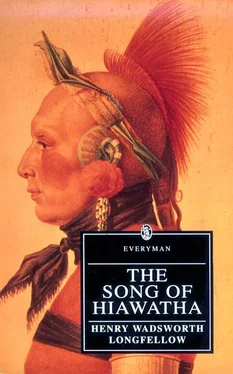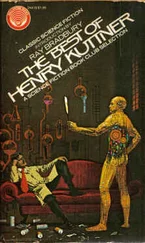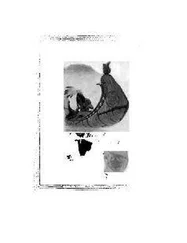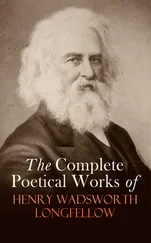Over them he stretched his right hand,
To subdue their stubborn natures,
To allay their thirst and fever,
By the shadow of his right hand;
Spake to them with voice majestic
As the sound of far-off waters,
Falling into deep abysses,
Warning, chiding, spake in this wise:
"O my children! my poor children!
Listen to the words of wisdom,
Listen to the words of warning,
From the lips of the Great Spirit,
From the Master of Life, who made you!
"I have given you lands to hunt in,
I have given you streams to fish in,
I have given you bear and bison,
I have given you roe and reindeer,
I have given you brant and beaver,
Filled the marshes full of wild-fowl,
Filled the rivers full of fishes:
Why then are you not contented?
Why then will you hunt each other?
"I am weary of your quarrels,
Weary of your wars and bloodshed,
Weary of your prayers for vengeance,
Of your wranglings and dissensions;
All your strength is in your union,
All your danger is in discord;
Therefore be at peace henceforward,
And as brothers live together.
"I will send a Prophet to you,
A Deliverer of the nations,
Who shall guide you and shall teach you,
Who shall toil and suffer with you.
If you listen to his counsels,
You will multiply and prosper;
If his warnings pass unheeded,
You will fade away and perish!
"Bathe now in the stream before you,
Wash the war-paint from your faces,
Wash the blood-stains from your fingers,
Bury your war-clubs and your weapons,
Break the red stone from this quarry,
Mould and make it into Peace-Pipes,
Take the reeds that grow beside you,
Deck them with your brightest feathers,
Smoke the calumet together,
And as brothers live henceforward!"
Then upon the ground the warriors
Threw their cloaks and shirts of deer-skin,
Threw their weapons and their war-gear,
Leaped into the rushing river,
Washed the war-paint from their faces.
Clear above them flowed the water,
Clear and limpid from the footprints
Of the Master of Life descending;
Dark below them flowed the water,
Soiled and stained with streaks of crimson,
As if blood were mingled with it!
From the river came the warriors,
Clean and washed from all their war-paint;
On the banks their clubs they buried,
Buried all their warlike weapons.
Gitche Manito, the mighty,
The Great Spirit, the creator,
Smiled upon his helpless children!
And in silence all the warriors
Broke the red stone of the quarry,
Smoothed and formed it into Peace-Pipes,
Broke the long reeds by the river,
Decked them with their brightest feathers,
And departed each one homeward,
While the Master of Life, ascending,
Through the opening of cloud-curtains,
Through the doorways of the heaven,
Vanished from before their faces,
In the smoke that rolled around him,
The Pukwana of the Peace-Pipe!
"Honor be to Mudjekeewis!"
Cried the warriors, cried the old men,
When he came in triumph homeward
With the sacred Belt of Wampum,
From the regions of the North-Wind,
From the kingdom of Wabasso,
From the land of the White Rabbit.
He had stolen the Belt of Wampum
From the neck of Mishe-Mokwa,
From the Great Bear of the mountains,
From the terror of the nations,
As he lay asleep and cumbrous
On the summit of the mountains,
Like a rock with mosses on it,
Spotted brown and gray with mosses.
Silently he stole upon him
Till the red nails of the monster
Almost touched him, almost scared him,
Till the hot breath of his nostrils
Warmed the hands of Mudjekeewis,
As he drew the Belt of Wampum
Over the round ears, that heard not,
Over the small eyes, that saw not,
Over the long nose and nostrils,
The black muffle of the nostrils,
Out of which the heavy breathing
Warmed the hands of Mudjekeewis.
Then he swung aloft his war-club,
Shouted loud and long his war-cry,
Smote the mighty Mishe-Mokwa
In the middle of the forehead,
Right between the eyes he smote him.
With the heavy blow bewildered,
Rose the Great Bear of the mountains;
But his knees beneath him trembled,
And he whimpered like a woman,
As he reeled and staggered forward,
As he sat upon his haunches;
And the mighty Mudjekeewis,
Standing fearlessly before him,
Taunted him in loud derision,
Spake disdainfully in this wise:
"Hark you, Bear! you are a coward;
And no Brave, as you pretended;
Else you would not cry and whimper
Like a miserable woman!
Bear! you know our tribes are hostile,
Long have been at war together;
Now you find that we are strongest,
You go sneaking in the forest,
You go hiding in the mountains!
Had you conquered me in battle
Not a groan would I have uttered;
But you, Bear! sit here and whimper,
And disgrace your tribe by crying,
Like a wretched Shaugodaya,
Like a cowardly old woman!"
Then again he raised his war-club,
Smote again the Mishe-Mokwa
In the middle of his forehead,
Broke his skull, as ice is broken
When one goes to fish in Winter.
Thus was slain the Mishe-Mokwa,
He the Great Bear of the mountains,
He the terror of the nations.
"Honor be to Mudjekeewis!"
With a shout exclaimed the people,
"Honor be to Mudjekeewis!
Henceforth he shall be the West-Wind,
And hereafter and forever
Shall he hold supreme dominion
Over all the winds of heaven.
Call him no more Mudjekeewis,
Call him Kabeyun, the West-Wind!"
Thus was Mudjekeewis chosen
Father of the Winds of Heaven.
For himself he kept the West-Wind,
Gave the others to his children;
Unto Wabun gave the East-Wind,
Gave the South to Shawondasee,
And the North-Wind, wild and cruel,
To the fierce Kabibonokka.
Young and beautiful was Wabun;
He it was who brought the morning,
He it was whose silver arrows
Chased the dark o'er hill and valley;
He it was whose cheeks were painted
With the brightest streaks of crimson,
And whose voice awoke the village,
Called the deer, and called the hunter.
Lonely in the sky was Wabun;
Though the birds sang gayly to him,
Though the wild-flowers of the meadow
Filled the air with odors for him;
Though the forests and the rivers
Sang and shouted at his coming,
Still his heart was sad within him,
For he was alone in heaven.
But one morning, gazing earthward,
While the village still was sleeping,
And the fog lay on the river,
Like a ghost, that goes at sunrise,
He beheld a maiden walking
All alone upon a meadow,
Gathering water-flags and rushes
By a river in the meadow.
Every morning, gazing earthward,
Still the first thing he beheld there
Was her blue eyes looking at him,
Two blue lakes among the rushes.
And he loved the lonely maiden,
Who thus waited for his coming;
For they both were solitary,
She on earth and he in heaven.
And he wooed her with caresses,
Wooed her with his smile of sunshine,
With his flattering words he wooed her,
With his sighing and his singing,
Gentlest whispers in the branches,
Softest music, sweetest odors,
Till he drew her to his bosom,
Folded in his robes of crimson,
Till into a star he changed her,
Trembling still upon his bosom;
And forever in the heavens
They are seen together walking,
Wabun and the Wabun-Annung,
Wabun and the Star of Morning.
Читать дальше












